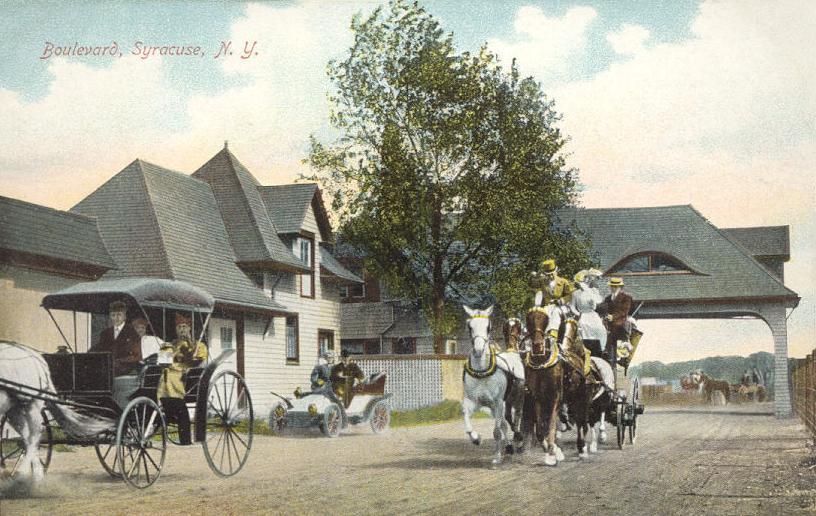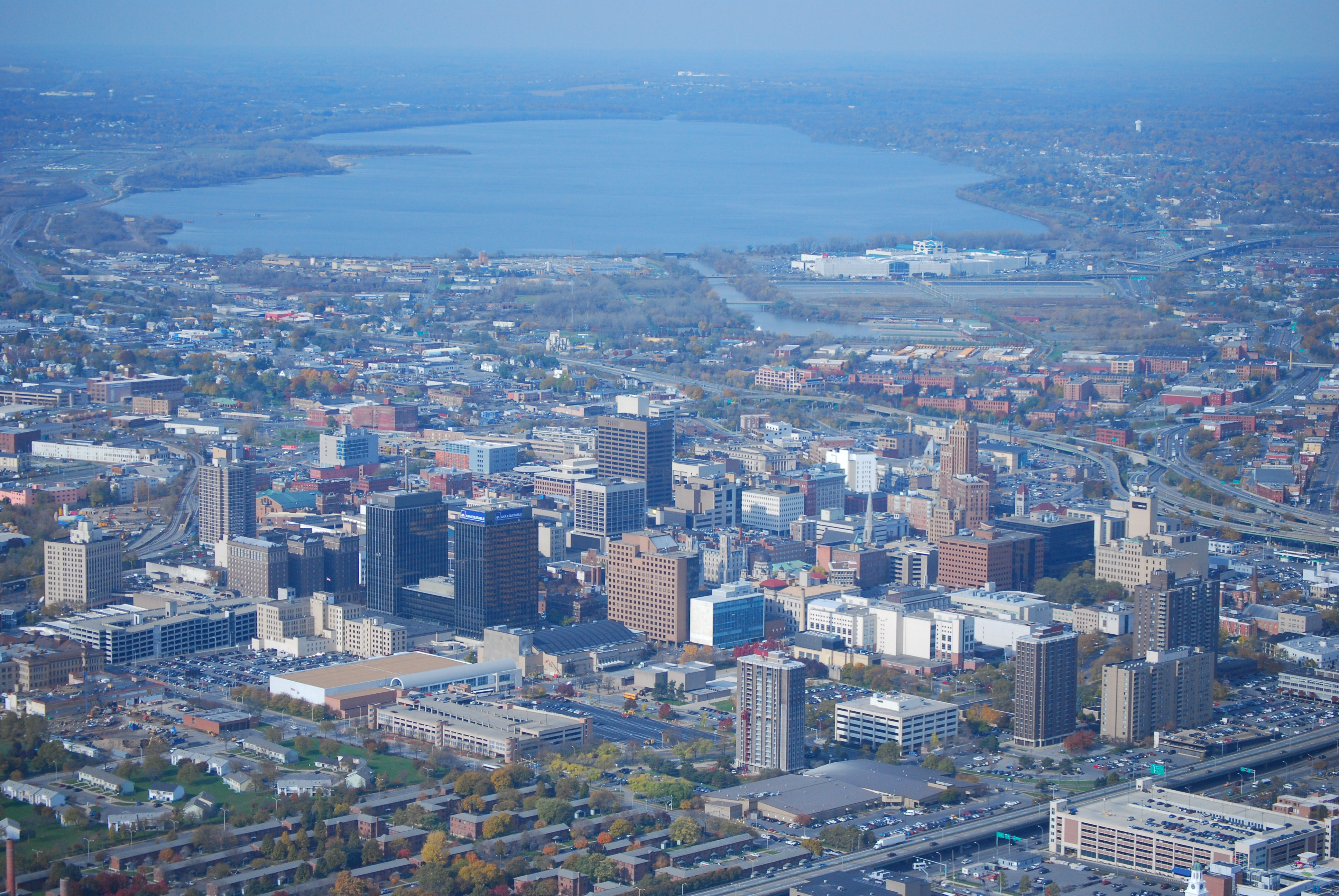|
Central New York Regional Transportation Authority
The Central New York Regional Transportation Authority, commonly referred to as Centro, is a New York State public benefit corporation and the operator of mass transit in Onondaga, Oswego, Cayuga, and Oneida counties in New York state. The CNYRTA was formed on August 1, 1970, along with similar agencies in Rochester, Albany, and Buffalo. Centro won the American Public Transportation Association's 2006 "Outstanding Public Transportation System Achievement Award" for bus companies serving 4 million to 30 million riders a year. Organization Centro has a 9-member board of directors, including one non-voting member. Its CEO is Brian Schultz. In 2017, Centro had operating expenses of $93.34 million, no outstanding debt, and a level of staffing of 738 people. Subsidiaries The Central New York Regional Transportation Authority is authorized by the State of New York to operate transit services in Cayuga, Cortland, Jefferson, Madison, Oneida, Onondaga, and Oswego counties. ... [...More Info...] [...Related Items...] OR: [Wikipedia] [Google] [Baidu] |
Syracuse, New York
Syracuse ( ) is a City (New York), city in and the county seat of Onondaga County, New York, Onondaga County, New York, United States. It is the fifth-most populous city in the state of New York following New York City, Buffalo, New York, Buffalo, Yonkers, New York, Yonkers, and Rochester, New York, Rochester. At the United States Census 2020, 2020 census, the city's population was 148,620 and its Syracuse metropolitan area, metropolitan area had a population of 662,057. It is the economic and educational hub of Central New York, a region with over one million inhabitants. Syracuse is also well-provided with convention sites, with a Oncenter, downtown convention complex. Syracuse was named after the classical Greek city Syracuse, Sicily, Syracuse (''Siracusa'' in Italian), a city on the eastern coast of the Italian island of Sicily. Historically, the city has functioned as a major Crossroads (culture), crossroads over the last two centuries, first between the Erie Canal and its ... [...More Info...] [...Related Items...] OR: [Wikipedia] [Google] [Baidu] |
Cortland County, New York
Cortland County is a county located in the U.S. state of New York. As of the 2020 census, the population of Cortland County was 46,809. The county seat is Cortland. The county is named after Pierre Van Cortlandt, president of the convention at Kingston that wrote the first New York State Constitution in 1777, and first lieutenant governor of the state. Cortland County comprises the Cortland, NY Micropolitan Statistical Area, which is also included in the Ithaca-Cortland, NY Combined Statistical Area. The Cortland apple is named for the county. History Early history Located in the glaciated Appalachian Plateau area of Central New York, midway between Syracuse and Binghamton, this predominantly rural county is the southeastern gateway to the Finger Lakes Region. Scattered archaeological evidence indicates the Iroquois also known as the Haudenosaunee controlled the area beginning about AD 1500. What was to become Cortland County remained within Indian territory until the ... [...More Info...] [...Related Items...] OR: [Wikipedia] [Google] [Baidu] |
Rome, New York
Rome is a city in Oneida County, New York, United States, located in the Central New York, central part of the state. The population was 32,127 at the 2020 United States census, 2020 census. Rome is one of two principal cities in the Utica–Rome Metropolitan Statistical Area, which lies in the "Leatherstocking Country" made famous by James Fenimore Cooper's ''Leatherstocking Tales,'' set in frontier days before the American Revolutionary War. Rome is in New York's 22nd congressional district. The city developed at an ancient portage site of Native Americans, including the historic Iroquois nations. This portage continued to be strategically important to Europeans, who also used the main 18th and 19th-century waterways, based on the Mohawk and Hudson rivers, that connected New York City and the Atlantic seaboard to the Great Lakes. The original European settlements developed around fortifications erected in the 1750s to defend the waterway, in particular the British Fort Stanwix ... [...More Info...] [...Related Items...] OR: [Wikipedia] [Google] [Baidu] |
Utica, New York
Utica () is a Administrative divisions of New York, city in the Mohawk Valley and the county seat of Oneida County, New York, United States. The List of cities in New York, tenth-most-populous city in New York State, its population was 65,283 in the 2020 United States Census, 2020 U.S. Census. Located on the Mohawk River at the foot of the Adirondack Mountains, it is approximately west-northwest of Albany, New York, Albany, east of Syracuse, New York, Syracuse and northwest of New York City. Utica and the nearby city of Rome, New York, Rome anchor the Utica–Rome Metropolitan Statistical Area comprising all of Oneida and Herkimer County, New York, Herkimer Counties. Formerly a river settlement inhabited by the Mohawk people, Mohawk Nation of the Iroquois Confederacy, Utica attracted European-American settlers from New England during and after the American Revolution. In the 19th century, immigrants strengthened its position as a layover city between Albany and Syracuse ... [...More Info...] [...Related Items...] OR: [Wikipedia] [Google] [Baidu] |
Auburn, New York
Auburn is a city in Cayuga County, New York, United States. Located at the north end of Owasco Lake, one of the Finger Lakes in Central New York, the city had a population of 26,866 at the 2020 census. It is the largest city of Cayuga County, the county seat, and the site of the maximum-security Auburn Correctional Facility, as well as the William H. Seward House Museum and the house of abolitionist Harriet Tubman. History The region around Auburn had been Haudenosaunee territory for centuries before European contact and historical records. Auburn was founded in 1793, during the post-Revolutionary period of settlement of western New York. The founder, John L. Hardenbergh, was a veteran of the Sullivan-Clinton campaign against the Iroquois during the American Revolution. Hardenbergh settled in the vicinity of the Owasco River with his infant daughter and two African-American indentured servants, Harry and Kate Freeman. After his death in 1806, Hardenbergh was buried in Aub ... [...More Info...] [...Related Items...] OR: [Wikipedia] [Google] [Baidu] |
Mexico, New York
Mexico is a town in the northeastern section of Oswego County, New York, United States. The population was 5,197 at the 2010 census. The town contains a village also named Mexico. Mexico has been referred to as the "Mother of Towns", as the original town as enacted by separate acts of 1792 and 1796 comprised an area that would eventually form six separate counties (Onondaga, Cortland, Oneida, Lewis, Jefferson, and Oswego). These six counties today contain a total of 84 separate towns that were once included in the original Town of Mexico. NY 69 passes through the town of Mexico and comes to an end in the village of Mexico, where it intersects with NY 104 (Main Street). U.S. Route 11 also passes through the town. History The first Mexico (a proposed county), with all the surrounding towns, was originally created from Town of Whitestown, Oneida County, New York, on April 10, 1792 by the State Land Commissioner. It was to include present day Oswego and Jefferson Counties. ... [...More Info...] [...Related Items...] OR: [Wikipedia] [Google] [Baidu] |
SUNY Oswego
State University of New York at Oswego (SUNY Oswego or Oswego State) is a public college in the City of Oswego and Town of Oswego, New York. It has two campuses: historic lakeside campus in Oswego and Metro Center in Syracuse, New York. SUNY Oswego was founded in 1861 as the Oswego Primary Teachers Training School by Edward Austin Sheldon, who introduced a revolutionary teaching methodology Oswego Movement in American education. In 1942 the New York Legislature elevated it from a normal school to a degree-granting teachers' college, Oswego State Teachers College, which was a founding and charter member of the State University of New York system in 1948. In 1962 the college broadened its scope to become a liberal arts college. SUNY Oswego currently has over 80,000 living alumni. Oswego State offers more than 100 academic programs leading to bachelor's degrees, master's degrees, and certificates of advanced study. It consists of four colleges and schools: College of Liberal Ar ... [...More Info...] [...Related Items...] OR: [Wikipedia] [Google] [Baidu] |
Fulton, Oswego County, New York
:''There is also a Fulton, Schoharie County, New York, Town of Fulton in Schoharie County, New York, Schoharie County, and a Fulton County, New York, Fulton County in New York.'' Fulton is a Administrative divisions of New York#City, city in the western part of Oswego County, New York, Oswego County, New York (state), New York, United States. The population was 11,896 as of the 2010 census. The city is named after Robert Fulton, the inventor of the steamboat. History The city of Fulton is a community in two parts. The area on the west side of the Oswego River (New York), Oswego River was formerly known as "Oswego Falls" recognizing the nearby rapids on the river. (The name "Oswego" is from the Iroquois word meaning "the outpouring.") It was one of the first regions settled in the original Granby, New York, Town of Granby. Settlements took place in two west-side locations, the "Upper Landing" and the "Lower Landing." The community was incorporated as a village in 1835. In 19 ... [...More Info...] [...Related Items...] OR: [Wikipedia] [Google] [Baidu] |
Syracuse University
Syracuse University (informally 'Cuse or SU) is a Private university, private research university in Syracuse, New York. Established in 1870 with roots in the Methodist Episcopal Church, the university has been nonsectarian since 1920. Located in the city's University Hill, Syracuse, University Hill neighborhood, east and southeast of Downtown Syracuse, the large campus features an eclectic mix of architecture, ranging from nineteenth-century Romanesque Revival architecture, Romanesque Revival to contemporary buildings. Syracuse University is organized into 13 schools and colleges, with nationally recognized programs in Syracuse University School of Architecture, architecture, Maxwell School of Citizenship and Public Affairs, public administration, S.I. Newhouse School of Public Communications, journalism and communications, Martin J. Whitman School of Management, business administration, Syracuse University School of Information Studies, information studies, Syracuse Univers ... [...More Info...] [...Related Items...] OR: [Wikipedia] [Google] [Baidu] |
Downtown Syracuse
Downtown Syracuse is the economic center of Syracuse, New York, and Central New York, employing over 30,000 people, and housing over 4,300. It is also one of the 26 officially recognized neighborhoods of Syracuse. History Downtown Syracuse, as the rest of the city, grew as a result of the city's salt industry and its location on the Erie Canal. For over a century, it was also the retail and entertainment center of Central New York, with large department stores such as Chappell's, The Addis Co., Flah's, E.W. Edwards, Woolworth's, Grant's, Lincoln Stores, The Mohican, David's, Kresge's, Clark Music Co., Dey Brothers, and Sibley's. This attribute began to fade with development of large suburban malls, with the final blow in 1992 when the combined Addis & Dey's department store became the last major store to leave downtown. South Salina Street South Salina Street between Erie Boulevard and West Onondaga Street was the main north-south artery of Downtown Syracuse and was amo ... [...More Info...] [...Related Items...] OR: [Wikipedia] [Google] [Baidu] |
Syracuse Transit Corporation
The former Syracuse Lines of New York State Railways were reorganized on November 22, 1939, as the Syracuse Transit Corporation (STC). This privately owned transit company inherited 27 transit routes serving the city and suburbs of Syracuse, seven of which were streetcar lines. By 1941, all lines had been converted to bus operation. All STC transit franchises were purchased by the public Central New York Regional Transportation Authority in 1972, continuing their operation as CNY Centro. History New York State Railways was created by the New York Central Railroad in 1909 to control several streetcar and interurban railway systems across upstate New York. The Syracuse Lines consisted of the city and suburban railways that had been previously consolidated under the Syracuse Rapid Transit Railway The Syracuse Rapid Transit Railway, an interurban railroad, was chartered on May 21, 1896. The company was a consolidation of the Syracuse Street Railroad Company, the Syracuse Consolidat ... [...More Info...] [...Related Items...] OR: [Wikipedia] [Google] [Baidu] |
Oswego, New York
Oswego () is a city in Oswego County, New York, United States. The population was 16,921 at the 2020 census. Oswego is located on Lake Ontario in Upstate New York, about 35 miles (55km) northwest of Syracuse. It promotes itself as "The Port City of Central New York." It is the county seat of Oswego County. The city of Oswego is bordered by the towns of Oswego, Minetto, and Scriba to the west, south, and east, respectively, and by Lake Ontario to the north. Oswego Speedway is a nationally known automobile racing facility. The State University of New York at Oswego is located just outside the city on Lake Ontario. History Early history The British established a trading post in the area in 1722 and fortified it with a log palisade later called Fort Oswego, named after the native Iroquois place name "os-we-go" meaning "pouring out place." The first fortification on the site of the current Fort Ontario was built by the British in 1755 and called the "Fort of the Six Nations." ... [...More Info...] [...Related Items...] OR: [Wikipedia] [Google] [Baidu] |





.jpg)



